| Srl | Item |
| 1 |
ID:
145769
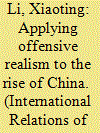

|
|
|
|
|
| Summary/Abstract |
This study employs offensive realism to provide a baseline for assessing Beijing's strategic choices in dealing with regional neighbors. In theory, when an ascending power is not yet capable of dominating its home region, it would strive foremost to prevent external powers from extending their influence in its vicinity. To attain that goal, it will likely adopt a carrots-and-sticks strategy, by rewarding some neighbors and punishing others according to their readiness to accommodate its ascendance and keep a cautious distance from external powers. Empirically, China's management of territorial disputes from the 1950s onward is quite consistent with these theoretical expectations. Viewed in this light, restraint and assertiveness are not inversely related in Chinese foreign policy behavior. Rather, they are two sides of the same coin and serve the same overriding purpose of countering adversarial (especially US) influences in China's neighborhood.
|
|
|
|
|
|
|
|
|
|
|
|
|
|
|
|
| 2 |
ID:
115718
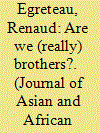

|
|
|
|
|
| Publication |
2012.
|
| Summary/Abstract |
This article considers the views that Chinese diplomats have developed on contemporary India. Using Chinese-written memoirs and essays, as well as discussions with active or retired diplomats of the People's Republic of China who served in India, this research explores the diversity of the Chinese elite's perceptions of the emergence, domestic politics and cultures of India today. It will be argued that four main sets of rather negative perceptions are produced: (1) candid views describing India in naïve, passionate or diplomatic ways; (2) judgemental opinions perpetuating a dirty-cum-messy image of India; and (3) more specifically of its corrupt and volatile communalism-prone society; and, finally, (4) more subtle insights on India's current polity. But, given the perpetuation of rather stable, yet tense, Sino-Indian interactions at the dawn of the 21st century, conclusions will be drawn on the relatively-low impact that Chinese critical perceptions of India have had on Beijing's recent policymaking towards New Delhi.
|
|
|
|
|
|
|
|
|
|
|
|
|
|
|
|
| 3 |
ID:
131178
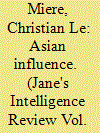

|
|
|
| 4 |
ID:
111215
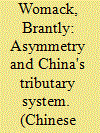

|
|
|
|
|
| Publication |
2012.
|
| Summary/Abstract |
In his article, 'Equilibrium Analysis of the Tributary System', Zhou Fangyin presents an important and stimulating application of the game theory of patterns of interaction to China's traditional diplomacy with its neighbors.1 His analysis contradicts the realist expectation that the larger power would simply dominate smaller powers in the context of international anarchy. However, his explanation of the tributary system does not rely on a cultural explanation based on Confucian morality, but rather on processes of conflictual interaction that lead to mutual accommodation between China and its neighbors.
Zhou rightly emphasizes the two-way character of the tributary system and the centrality of its basic idea for Chinese diplomacy. In contrast to John Fairbank, he argues that it is more than a diplomatic cover for a trade relationship. In contrast to the general assumption that tribute is a form of booty that a larger power requires from a smaller power, he emphasizes China's primary interest in stabilizing its relationships with neighbors through concessions. Indeed, it appears from Zhou's narration that China is at the disadvantaged side of tributary relationships: frustrated in conflicts and conceding to neighbors in order to pacify its borders. By providing a clear and plausible model for interaction and interesting, complex cases of processes through which to arrive at equilibrium, Zhou has, indeed, made a contribution to both theory and history.
|
|
|
|
|
|
|
|
|
|
|
|
|
|
|
|
| 5 |
ID:
125238
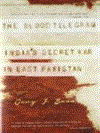

|
|
|
|
|
| Publication |
Noida, Random House Publishers India Pvt Ltd, 2013.
|
| Description |
xxiv, 499p.Hbk
|
| Standard Number |
9788184003703
|
|
|
|
|
|
|
|
|
|
|
|
Copies: C:1/I:0,R:0,Q:0
Circulation
| Accession# | Call# | Current Location | Status | Policy | Location |
| 057494 | 327.73054/BAS 057494 | Main | On Shelf | General | |
|
|
|
|
| 6 |
ID:
084511
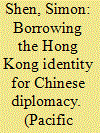

|
|
|
| 7 |
ID:
161995
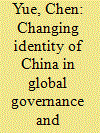

|
|
|
| 8 |
ID:
179239
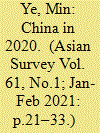

|
|
|
|
|
| Summary/Abstract |
The COVID-19 pandemic wreaked havoc on China, causing tremendous losses. It also accelerated the trend of power concentration, both within the state and inside the Communist Party. With tensions between the US and China mounting in more areas, bilateral relations dropped to the lowest point since the end of the Cold War. On its periphery, China also saw crises of varying intensity over Hong Kong, Taiwan, the Uyghurs, and the disputed border with India.
|
|
|
|
|
|
|
|
|
|
|
|
|
|
|
|
| 9 |
ID:
185197
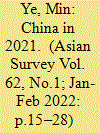

|
|
|
|
|
| Summary/Abstract |
The year 2021 saw unceasing power concentration in China and inside the ruling Communist Party. China persisted with a zero-COVID policy, but at considerable social and economic costs. The investigation of the origins of the pandemic triggered new sparring between China and Western countries. US–China relations continued to sour as the Biden administration kept on with most of the existing China policies and started building a new security network in the Indo-Pacific region. China tightened its control of Hong Kong’s political life, but its effort toward “complete reunification” faced strong resistance across the Taiwan Strait.
|
|
|
|
|
|
|
|
|
|
|
|
|
|
|
|
| 10 |
ID:
110898
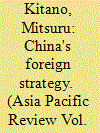

|
|
|
|
|
| Publication |
2011.
|
| Summary/Abstract |
This article introduces four trends of China's foreign strategy. Analysis of China's diplomacy since the 1980s based on these concepts demonstrates China's intent to become a great power and its aspirations for a China-centric order.
|
|
|
|
|
|
|
|
|
|
|
|
|
|
|
|
| 11 |
ID:
096330
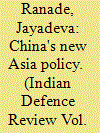

|
|
|
| 12 |
ID:
100614
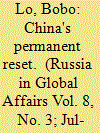

|
|
|
| 13 |
ID:
125973
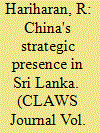

|
|
|
| 14 |
ID:
126398
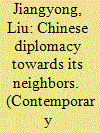

|
|
|
| 15 |
ID:
178804
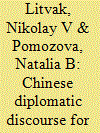

|
|
|
|
|
| Summary/Abstract |
New means of information warfare are now used to achieve new goals,
namely, cultural dominance and, as a result, control of other states and
peoples. In this respect, more and more attention has recently been paid
to the changing content and form of public communications by Chinese
politicians, including diplomats. The article studies the speeches of Chinese
ambassadors in key European countries (Germany, France, Great Britain, and
Italy) on two issues for which Chinese policy has lately drawn most of the Western criticism: the situation in Hong Kong and the COVID-19 pandemic.
To determine the dynamics of the diplomatic discourse, speeches made
between 2013 and mid-2020 were selected for analysis. The study is novel
in that it tests the comprehensive analysis methodology, in particular Michel
Foucault’s concept of discourse in combination with Jacques Derrida’s
concept of deconstruction. The analysis made points to the change in the
style of the Chinese diplomats’ communication towards its “mediatization,”
preference to appeal directly to the European media and general public,
doing so skillfully and with scientific substantiation.
|
|
|
|
|
|
|
|
|
|
|
|
|
|
|
|
| 16 |
ID:
112842
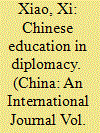

|
|
|
|
|
| Publication |
2012.
|
| Summary/Abstract |
This article reflects upon contemporary education in Chinese diplomacy covering three aspects: curriculum contents, teaching methods and teaching goals. It argues that the curriculum contents have the following shortcomings: poor awareness of the real problems in China's diplomatic practices, lack of global awareness that is consistent with China's image as a great country, blurring of the boundaries between academic and policy systems, oversight of practices and lack of good understanding of ancient, early modern and contemporary Chinese diplomacy and lack of adequate training in research methodologies. Teaching methods are problematic as the continued dependence on traditional historical research methods has failed to recognise the usefulness of theoretical analytic tools. Also, the value of case studies has not been fully recognised and utilised. With regard to teaching goals, Chinese diplomatic teaching desperately needs some vitality. This article makes recommendations for improving Chinese education in diplomacy, such as applying psychology in diplomatic education, offering a course on comparative diplomacy, developing a course on diplomacy theory, emphasising diplomatic history and improving the training in social sciences research methodologies.
|
|
|
|
|
|
|
|
|
|
|
|
|
|
|
|
| 17 |
ID:
110689
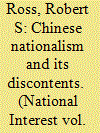

|
|
|
|
|
| Publication |
2011.
|
| Summary/Abstract |
AT NO time since the end of the Cold War have U.S.-China relations been worse. Yes, in the past there have been periodic confrontations over Taiwan, and tensions over the American bombing of the Chinese embassy in Belgrade and the Chinese fighter-jet collision with an American reconnaissance plane over the South China Sea. But the current downturn reflects a potential long-term trend with the likelihood of protracted strategic conflict. Equally troubling, this raising of tensions is not only unnecessary but also potentially costly to the United States.
|
|
|
|
|
|
|
|
|
|
|
|
|
|
|
|
| 18 |
ID:
155018
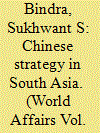

|
|
|
|
|
| Summary/Abstract |
Sukhwant S Bindra traces the changes in Chinese diplomacy over the past few decades, with special reference to India, Pakistan, other South Asian countries and Russia. He points out that the Sino–Pak alliance has grown out of converging interests, although Beijing is wary of Pakistan’s internal instability and support of Islamic radicalism in Asia. He concludes that India has no choice but to simultaneously collaborate with and stand up to China.
|
|
|
|
|
|
|
|
|
|
|
|
|
|
|
|
| 19 |
ID:
114770
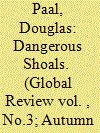

|
|
|
| 20 |
ID:
126246
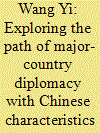

|
|
|